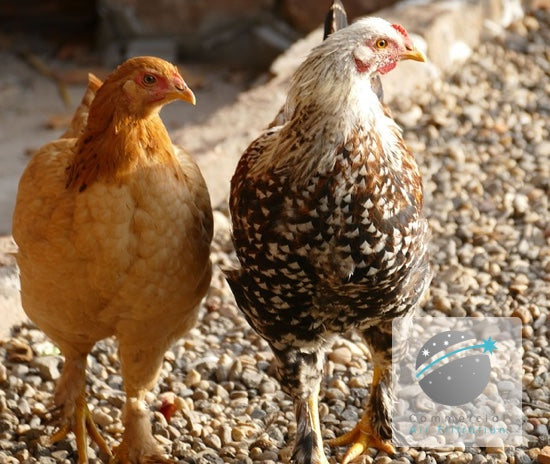People who work with poultry often report a wide range of respiratory symptoms including a cough, eye irritation, breathlessness, chest tightness, nasal congestion and wheezing. This raises concerns about poultry dust as a respiratory hazard. Agricultural workers, in general, tend to have a much higher incidence of occupational asthma than the national average and poultry workers seem to be particularly at risk. The longer someone has worked on a poultry farm and is exposed to particulate pollution, the more likely they are to develop chronic respiratory problems. Workers in cage-housed facilities seem to have more problems than those in floor-housed facilities.
This is hardly surprising that there is a concern about poultry dust as a respiratory hazard, as workers are exposed to a potent and complex mix of toxins and allergens that makes up the poultry dust. The evidence that components of poultry dust are harmful to health is so strong that poultry dust is listed in Control of Substances Hazardous to Health (COSHH) regulations.
The various activities that go on in a poultry farm, including handling and inspection of birds, removing their litter, upkeep and cleaning of their cages and laying down litter, all contribute to the complexity of poultry dust. It may vary in its composition from pure wood dust to a mixture of organic and inorganic components including feathers, dander, mites, fungi and bacteria. As well as particles ranging in size from 0.5 to 50 microns, poultry workers are also exposed to gases like ammonia and hydrogen sulphide.
Research has shown how specific components make poultry dust a respiratory hazard. For example:
- Wood dust: Poultry bedding often consists of softwood shavings and comes from pine, yew and cedar. Exposure to softwood dust has been linked to skin problems, rhinitis, and occupational asthma.
- Poultry feed: Usually, the feed is in the form of grain, pellets or meal, with their major component being cereals. Feed is very prone to fungal growth, and fungal spores can be a potent allergen. It may also contain various wheat allergens and pollens. Stored feed attracts mites - many of them closely related to our old enemy, the house dust mite, and equally prone to cause allergy problems. Grain dust will contain many contaminants including bacteria, microbial toxins, insects, animal hair, feathers, insect or animal droppings, pollens and pesticides. Inhaling grain dust is known to cause asthma, bronchitis, and nasal and eye irritation.
- Vaccines: Part of the poultry worker's job is to vaccinate the birds which involve close handling and exposure to feathers and dander which are also potent allergens.
- Bacteria and fungi: Any agricultural environment will contain lots of soil and dust, which are a breeding ground for bacteria and fungi. Bacteria can cause gastrointestinal problems. Meanwhile, long-term or repeated exposure to airborne fungal spores in agricultural environments is known to be a contributing factor in lung function decline and in allergic disease such as asthma.
- Toxins: Endotoxins, which come from the cell walls of certain bacteria, are a component of poultry dust. Exposure to endotoxin causes acute respiratory symptoms, including a cough, shortness of breath and lung function impairment. Poultry workers with existing lung problems are even more susceptible.
In summary, poultry dust contains many components which could trigger allergic respiratory disease and make an existing disease worse. Legal limits of air pollution regarding poultry should be evaluated and measured against. Three components in particular - softwood dust, grain dust and storage mites - are known asthmagens (substances that cause occupational asthma). Therefore, employers in the poultry industry have to undertake careful health surveillance of their employees (this is a legal duty). Another requirement (under COSHH regulations) is to ensure that levels of poultry dust are prevented, or at least adequately controlled, which means paying attention to ventilation and air purification.
Contact us today for the most effective and cost-efficient air filtration solutions: 020 3176 0524 Talk to one of our experts about how to reduce your exposure to poultry dust today.




